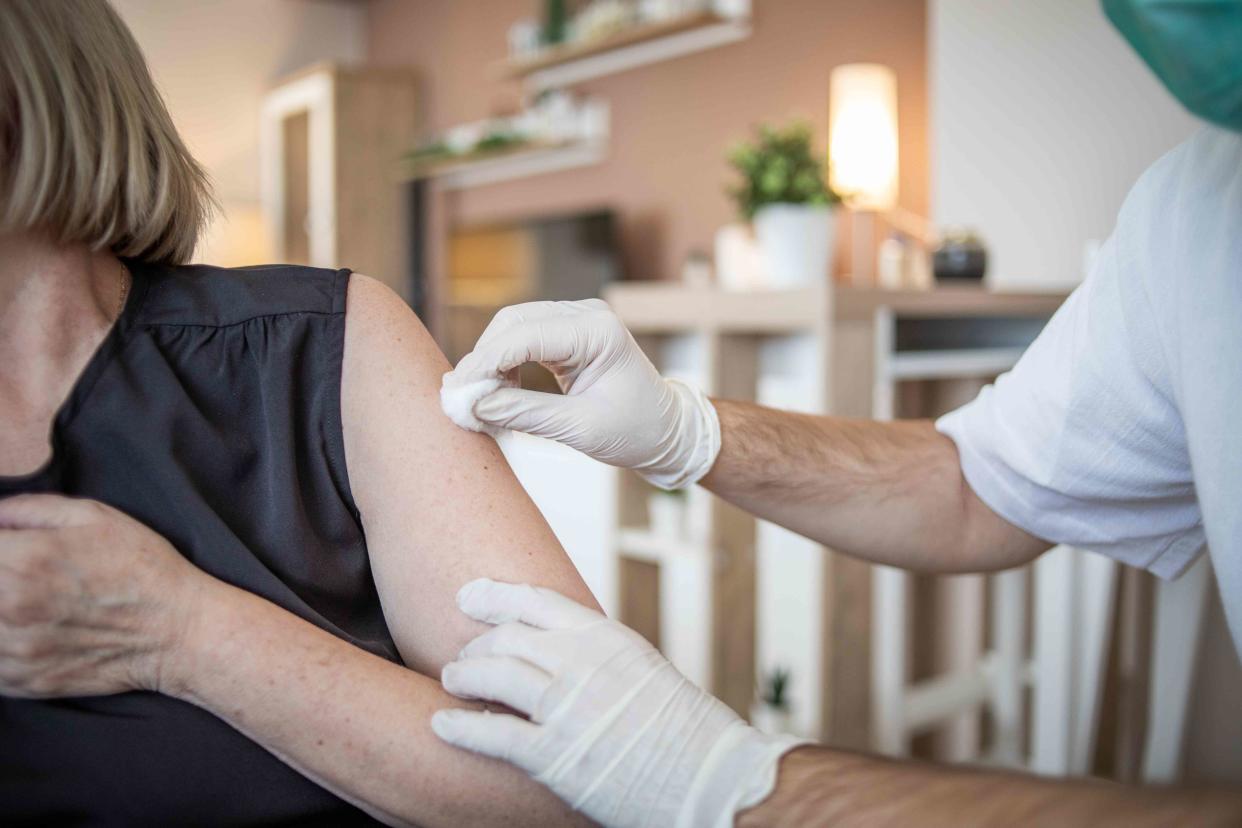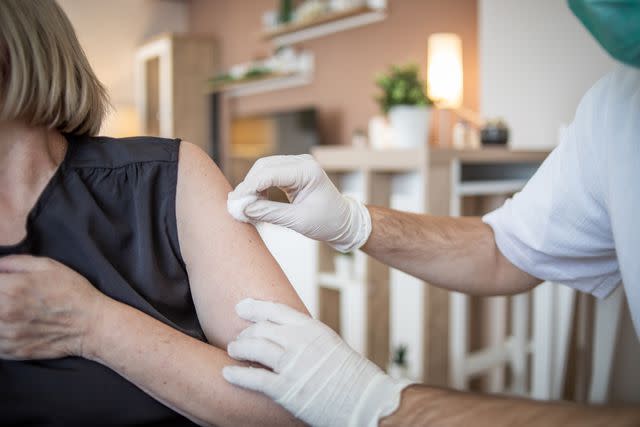Who Is Eligible for a Second Bivalent Booster? New CDC Recommendations, Explained

Milan Markovic/Getty Images
Fact checked by Nick Blackmer
The CDC updated its recommendations for COVID-19 boosters this week, encouraging seniors and individuals with a compromised immune system to receive a second booster vaccination.
Current boosters are bivalent shots, a newer vaccine than the original, monovalent COVID-19 vaccines.
Experts recommend maintaining an up-to-date vaccination status in order to best fight off the COVID-19 virus.

Milan Markovic/Getty Images
The Centers for Disease Control and Prevention (CDC) announced updated recommendations for COVID-19 vaccinations last week, specifically for seniors and those with compromised immune systems.
Health officials have continued to update recommendations for COVID-19 vaccinations, focusing on demographics who are more at risk for severe COVID-19 symptoms—senior citizens and immunocompromised individuals among them. Under the newest recommendations, people who are at least 65 years old or immunocompromised can receive a second booster shot to further strengthen their protection against the virus.
“The CDC’s updated guidance allows more flexibility for healthcare providers to administer additional doses to their immunocompromised patients as needed, taking into consideration the individual’s clinical circumstances,” Kate Grusich, public affairs specialist at the CDC. told Health.
Health officials also simplified the vaccinations going forward. Now, anyone getting a Pfizer or Moderna shot—regardless of whether they are getting a booster or their first-ever COVID vaccine—will now get a bivalent shot. This is a more evolved vaccine than the original, monovalent shot.
“The original (monovalent) vaccines were formulated to protect against the original virus that causes COVID-19,” Grusich explained. “Updated (bivalent) COVID-19 vaccines protect against both the original strain and the Omicron subvariants, BA.4 and BA.5.”
According to Grusich, the Food and Drug Administration (FDA) advised manufacturers last summer to add these subvariant components to their COVID-19 vaccine boosters. For this reason, the original monovalent vaccine is no longer recommended for use in the United States.
Related:What to Know About COVID Reinfections as BA.5 Cases Continue to Rise
When Am I Eligible for an Additional Booster?
Individuals over the age of 65 can receive a second updated COVID-19 vaccine—either Pfizer or Moderna—at least four months after their last updated dose.
“People ages 6 months of age and older who are moderately or severely immunocompromised can receive an additional updated COVID-19 vaccine at least two months after their last dose and, at the discretion of their healthcare provider,” Grusich added.
If you are unable to get the mRNA vaccine due to an allergy, as a result of anaphylaxis to a previous dose, or because it is unavailable in your area, there are alternatives available. Grusich pointed to Novavax and Janssen as non-mRNA COVID-19 vaccines that have been authorized in the U.S.
If you are unsure if the new booster is right for you based on a previous response, or because you are unsure of how long you should wait for another booster, speak to a healthcare provider. They can advise you of the best route of vaccination for you as well as when you should get a second booster given your medical history.
If you are looking for a COVID-19 vaccination location near you, you can search vaccines.gov. You also can text your zip code to 438829 (for English), or 882862 (for Spanish), or call 1-800-232-0233 to find out who has booster near you.
Considering Another Booster?
For those who are eligible, the risk of not getting a second dose is that you will not be as well protected against being infected with the virus that causes COVID-19. And, if you do become infected you are at greater risk of severe illness or death, explained David Souleles, MPH, the director of the masters in public health program at the University of California, Irvine and the UCI director of COVID-19 response.
“We have seen throughout the pandemic that older adults, in general, are more likely to get very sick or die from COVID-19, and the older you are, the greater the risk,” Souleles said. “With current bivalent COVID-19 vaccine experience, we also have seen that protection wanes over time.”
Anyone with a less than robust immune system—whether from age, illness, or the need to take immunosuppressive drugs—should consider getting a booster shot, added Linda S. Yancey, MD, a specialist in infectious diseases at Memorial Hermann Hospital System in Houston.
“It refreshes the protection given by the first dose,” Dr. Yancey said. “In much the same way that paint colors fade over time, the immune response to the COVID vaccine wanes with time. People should get the booster for the same reason we all have to repaint our trim every so often.”
Related:COVID Increases Risk of Long-Term Brain Injury, Study Shows
Should I Be Concerned About Getting So Many Shots
More than 672 million doses of the COVID-19 vaccine have been given in the United States and have been monitored through one of the most intense safety monitoring systems in U.S. history, Souleles said.
“COVID-19 vaccines are safe and effective, including the additional bivalent dose recommended for those over 65 and those who are immunocompromised.”
Souleles noted that some people do experience side effects after getting a vaccine dose while others may have no side effects. Common side effects include pain, redness, or swelling at the injection site. Other side effects include tiredness, headaches, muscle pain, chills, fever, and nausea.
“In rare cases, people have experienced a serious health event after COVID-19 vaccination,” Souleles said.
He added that anytime someone experiences complications after getting vaccinated, this is considered an adverse event and can be caused by the vaccine or be a coincidence. But systems are in place in the United States to monitor, track, and investigate adverse events.
“The new vaccines now give broader protection against [current strains} and future emerging strains,” Dr. Yancey concluded. “In the same way we get a flu shot every fall because the virus mutates and changes, we now have the bivalent vaccine to better protect again newer COVID strains.”
Related:Who's at Risk for Long COVID? A Study Says These 4 Factors May Predict Persistent Symptoms
For more Health news, make sure to sign up for our newsletter!
Read the original article on Health.

